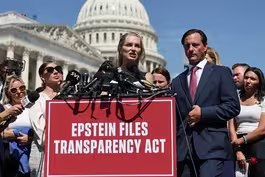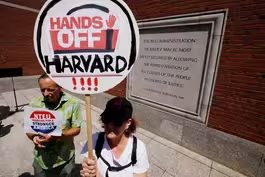
Rulings stall Trump policies, setting up Supreme Court fight
Clip: 9/3/2025 | 5m 19sVideo has Closed Captions
Trump policies stalled by series of rulings, likely setting up Supreme Court fight
A federal court rejected the Trump administration's use of an 18th-century wartime law, known as the Alien Enemies Act, to deport Venezuelans accused of being gang members. It's another legal setback for the White House, which has also seen courts curtail its authority to impose tariffs and send troops into U.S. cities. William Brangham discussed more with Georgetown law professor Steve Vladeck.
Problems playing video? | Closed Captioning Feedback
Problems playing video? | Closed Captioning Feedback
Major corporate funding for the PBS News Hour is provided by BDO, BNSF, Consumer Cellular, American Cruise Lines, and Raymond James. Funding for the PBS NewsHour Weekend is provided by...

Rulings stall Trump policies, setting up Supreme Court fight
Clip: 9/3/2025 | 5m 19sVideo has Closed Captions
A federal court rejected the Trump administration's use of an 18th-century wartime law, known as the Alien Enemies Act, to deport Venezuelans accused of being gang members. It's another legal setback for the White House, which has also seen courts curtail its authority to impose tariffs and send troops into U.S. cities. William Brangham discussed more with Georgetown law professor Steve Vladeck.
Problems playing video? | Closed Captioning Feedback
How to Watch PBS News Hour
PBS News Hour is available to stream on pbs.org and the free PBS App, available on iPhone, Apple TV, Android TV, Android smartphones, Amazon Fire TV, Amazon Fire Tablet, Roku, Samsung Smart TV, and Vizio.
Providing Support for PBS.org
Learn Moreabout PBS online sponsorshipAMNA NAWAZ: Well, Harvard University won a major legal victory today when a federal judge said that the government had broken the law by freezing billions of dollars in research funding.
GEOFF BENNETT: As William Brangham explains, it's one of the latest in a series of court rulings putting the brakes on some administration policies, which are likely headed to the Supreme Court.
WILLIAM BRANGHAM: That's right.
Harvard's legal win today was a significant victory for the university, which had sued the administration, arguing that its canceling of research grants trampled the school's due process and First Amendment rights.
Separately, a Fifth Circuit panel yesterday blocked the administration's from using an 18th century law to deport alleged Venezuelan gang members.
And then, last week, another court ruled that the president overstepped his authority by issuing his sweeping tariffs against other nations.
So, for some perspective on these legal developments, we are joined again by Georgetown Law Professor Steve Vladeck.
Steve, thank you so much for being here.
Let's start with the Harvard case first.
The administration had argued that Harvard wasn't doing enough to stamp out antisemitism on campus.
And so it blocked all of these research grants, billions of dollars.
Harvard sued and won.
What did this judge rule that the administration had done wrong?
STEVE VLADECK, Georgetown University Law Center: Yes, I mean, so, William, there, I think, are two different problems here.
The first is that federal law provides a process for revoking those kinds of grants, for bringing claims of discrimination against universities like Harvard.
They didn't follow it here.
And, second, there were the obvious First Amendment issues with going after a university based on what really looks like, for the most part, constitutionally protected speech.
As you mentioned, it's just a district court.
It still has to go up to the federal appeals court in Boston and probably from thence to the Supreme Court, but it's a big win for Harvard and another in, as you say, a number of recent losses for this administration.
WILLIAM BRANGHAM: OK, separately, the Fifth Circuit Court of Appeals, which many people consider one of the most conservative circuits in the country, said that the Trump's administration's use of this 18th century law known as the Alien Enemies Act meant that the administration could not be deporting alleged gang members from Venezuela.
Again, what did the -- what did this panel rule in that case?
STEVE VLADECK: Yes, so this is a really important ruling from last night.
The panel held that we really just aren't being invaded, and we're not subject to what the Alien Enemies Act refers to as a predatory incursion from Tren de Aragua, from the Venezuelan government.
William, it's a big deal, not just because of what it means specifically for the president's efforts to use this statute for mass summary removals of Venezuelan migrants.
It's a big deal because it suggests that courts, even like the fairly conservative Fifth Circuit, are starting to view with a fair amount of skepticism claims by the president, by this administration that we're being invaded, that there's an emergency, that conditions on the ground are different from what, to all appearances, they really are.
WILLIAM BRANGHAM: Separately on that same front, again, a different case, the president faced this -- another setback on Friday when a federal appeals court ruled that the administration had overstepped its authority when the president issued these sweeping, vast tariffs against many of our trading partners.
Again, what did the court say as to why the president did not have that authority?
STEVE VLADECK: So this was the full federal circuit here in Washington, and by a 7-4 vote, it held that the tariffs that President Trump had imposed, at least many of them, were not authorized by this 1977 statute, the International Economic Emergency Powers Act, William, again, because the court took issue with how the president viewed not just the underlying circumstances, but with how the president interpreted the statute, which doesn't seem to contemplate tariffs at all, let alone tariffs like these.
That ruling is at least on hold for the time being, at least until October 14, but also setting up a major test case for the Supreme Court as recently as in its next term.
WILLIAM BRANGHAM: Lastly, Steve, in just the last few seconds, I know you follow all of these cases quite closely.
How do you measure how the courts are standing up to or acquiescing to the Trump administration, which has shown that it really wants to exercise executive authority?
STEVE VLADECK: So, I think that the short version is the courts are pushing back fairly aggressively.
They're pushing back on the merits and not just on procedural grounds.
And what this is all really setting up, William, is a series of major test cases for the Supreme Court to confront the Trump administration as early as next spring.
WILLIAM BRANGHAM: Steve Vladeck of Georgetown, always great to talk to you.
Thanks.
STEVE VLADECK: Thank you.
Climate refugees forced to adapt as rising sea swallows land
Video has Closed Captions
Clip: 9/3/2025 | 8m 36s | As rising sea levels swallow Bangladesh's land, its climate refugees are forced to adapt (8m 36s)
Epstein survivors demand justice as Trump calls case a hoax
Video has Closed Captions
Clip: 9/3/2025 | 3m 1s | Epstein survivors demand justice in Washington as Trump calls case 'a Democrat hoax' (3m 1s)
How future workers will adapt as AI reshapes jobs
Video has Closed Captions
Clip: 9/3/2025 | 6m 57s | How the next wave of workers will adapt as artificial intelligence reshapes jobs (6m 57s)
Museum showcases the pets who have lived in the White House
Video has Closed Captions
Clip: 9/3/2025 | 5m 19s | Museum exhibit showcases the pets who have lived in the White House (5m 19s)
News Wrap: Court says Trump unlawfully blocked Harvard funds
Video has Closed Captions
Clip: 9/3/2025 | 6m 15s | News Wrap: Judge rules White House unlawfully blocked Harvard's research grants (6m 15s)
'This is not a political issue,' Epstein survivor says
Video has Closed Captions
Clip: 9/3/2025 | 7m 51s | 'This is not a political issue, this is a crime,' Epstein survivor says (7m 51s)
What China's military parade and diplomacy mean for U.S.
Video has Closed Captions
Clip: 9/3/2025 | 9m 42s | What China's display of military might and diplomacy mean for the U.S. (9m 42s)
Providing Support for PBS.org
Learn Moreabout PBS online sponsorship
- News and Public Affairs

FRONTLINE is investigative journalism that questions, explains and changes our world.

- News and Public Affairs

Amanpour and Company features conversations with leaders and decision makers.












Support for PBS provided by:
Major corporate funding for the PBS News Hour is provided by BDO, BNSF, Consumer Cellular, American Cruise Lines, and Raymond James. Funding for the PBS NewsHour Weekend is provided by...






